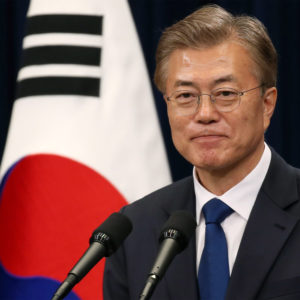SEOUL — South Korean leadership, by banning defectors from launching balloons wafting leaflets over North Korea, has struck a devastating blow against free speech and freedom of information in both Koreas.
The anti-leaflet legislation is inspiring an adverse reaction not only in Seoul but also at the United Nations and in Washington, where members of congress are denouncing it for compromising basic human rights.
The most meaningful response was the plea by Tomas Ojea Quintana, U.N. special rapporteur on human rights in the North, for the South’s national assembly to reverse course and repeal the amendment to the act on inter-Korean relations that would impose fines and prison sentences on those daring to defy the new bill.
For Quintana, who attacks outrageous violations of human rights in the North, to find fault with South Korea for enacting such a measure was a shocking reminder of the seriousness of this assault on the rights of defectors.
North Koreans, deprived of any understanding about the origins of the Korean War and the nature of the dictatorship that dominates their lives, are entitled to the news and views in these leaflets. The leafleteers have a right to say what they think and disseminate their ideas to people who should know what they have to say.
These leaflets pack a lot of information on waterproof sheets of plastic. How else are ordinary North Koreans likely to learn that regime founder Kim Il-sung was a stooge for the Russians, who implanted him in power in 1945?
And how would they know that his grandson, Kim Jong-un, ordered the murder of his older half-brother, Kim Jong-nam, killed by a VX chemical agent smeared on his face in Kuala Lumpur’s international airport nearly four years ago?
Clearly the leaflets hit the North Korean leadership where it hurt. North Korea over the years has demanded that South Korea stop defectors from firing them, but no one ever objected so harshly as Kim Jong-un’s younger sister, Kim Yo-jong.
Six months ago, she demanded that South Korean leaders “take care of the consequences of evil conduct by the rubbish-like mongrel dogs who took no scruple to slander us while faulting the ‘nuclear issue’ in the meanest way at the most untimely time.”
U.S. Rep. Chris Smith (R-N.J.) was the first member of Congress to come out with a strongly worded attack on the anti-leaflet law.
Voicing “serious concerns over the trajectory in South Korea under President Moon Jae-in,” Smith said the Moon government was guilty of “undue acquiescence not only to the communist Democratic People’s Republic of Korea — as evidenced by this inane legislation criminalizing humanitarian outreach to North Korea — but also a diplomatic tilt toward Communist China.
Rep. Michael McCaul of Texas, a Republican on the House Foreign Affairs Committee, summarized the bitter irony of South Korea suppressing free speech at the bidding of North Korea.
“A bright future for the Korean Peninsula rests on North Korea becoming more like South Korea, not the other way around,” he said. McCaul clearly hopes that members of President-elect Joseph Biden’s Democratic Party will agree.
“Freedom of expression is a core democratic value,” he said. “Bipartisan majorities in the US Congress have long supported efforts to make outside information available in North Korea’s closed dictatorship.”
Now it’s up to the Biden administration to decide how strongly to press the issue of human rights in North Korea.
We can only hope that Biden will want to deal more strongly than did Trump, who dropped the subject after having spoken out strongly about North Korea’s record in his first year as president.
In 2018, Trump decided on a totally different approach. In his summit with Kim Jong-un in Singapore in June of that year, he believed they had become such good friends they “fell in love.”
The controversy, though, is not ending.
John Sifton, Asia advocacy director of Human Rights Watch in New York, summarized the great paradox in the South Korean position.
“The South Korean government seems more interested in keeping North Korea’s Kim Jong Un happy than letting its own citizens exercise their basic rights on behalf of their northern neighbors,” he said. “The bill does a great disservice to the people of both South Korea and North Korea.”
The bipartisan Tom Lantos Human Rights Commission of Congress will discuss the topic after Biden’s inauguration, and human rights activists everywhere are not going to drop the subject.
Eventually, those responsible for the bill may realize that muzzling the balloonists was a big mistake.

